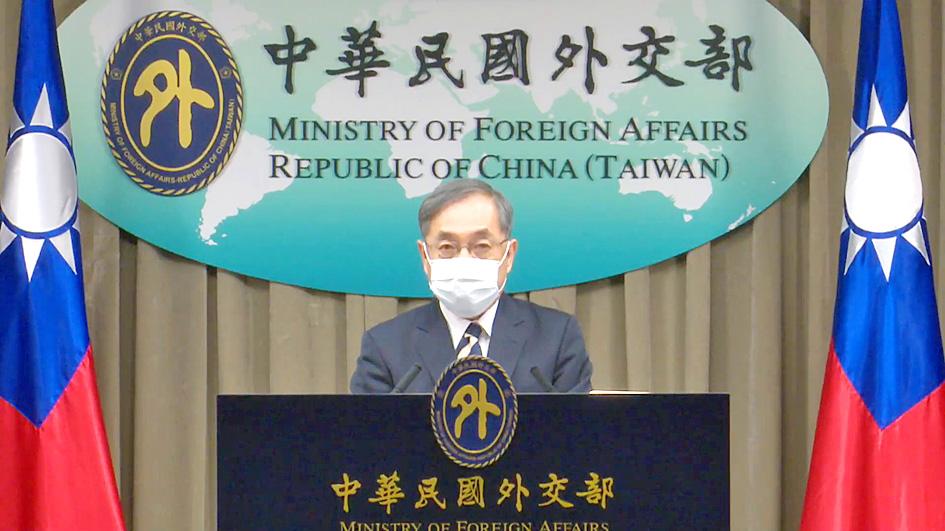The Ministry of Foreign Affairs yesterday sought to reassure Taiwanese businesses with operations in Nicaragua that their interests would be protected after the Central American nation last month severed relations with Taipei in favor of Beijing.
Five days after the decision was announced on Dec. 10, the Nicaraguan legislature also voted to nullify the nation’s free-trade agreement (FTA) with Taiwan, ignoring the required 180-day grace period in a blow to Taiwanese traders.
To help businesses weather the transition period, the government is finalizing temporary response measures, which are to be announced in the next few days, Department of International Cooperation and Economic Affairs Deputy Director-General Isaac Chiu (邱陳煜) said.

Photo: Lu Yi-hsuan, Taipei Times
In addition to these measures, it is also to help businesses expand into other potential markets such as Belize and Paraguay, Chiu said.
Agreements on economic cooperation with the two countries went into effect this month, enabling products such as Belizean prawns and Paraguayan hamburger beef to enter Taiwan duty-free, he said.
As for companies that receive subsidies for investing in an allied nation, Chiu said that although Nicaragua has severed ties, the government would still help businesses apply for grants in a “sensible, reasonable and legal” manner.
Trade between Taiwan and Nicaragua skyrocketed after the FTA went into effect in 2008, climbing from US$47.44 million when the agreement was signed in 2006 to more than US$160 million last year.
Nicaragua is one of the largest importers of Taiwanese fishery products, while Taiwan is Nicaragua’s largest market in Asia, Ministry of Economic Affairs data show.
Nicaragua is Taiwan’s second-largest source of frozen shrimp, and also a large supplier of beef, coffee and sugar.
Separately yesterday, the foreign ministry said that democratic nations do not recognize China’s unilateral interpretation of “one China” and they believe that neither side of the Taiwan Strait should be subordinate to the other.
The foreign ministry made the remarks in condemnation of Beijing’s “shock” at Slovenia’s plan to open reciprocal representative offices with Taiwan.
“The fact that the Republic of China (Taiwan) is a free and democratic nation has already won the respect of the world,” foreign ministry spokeswoman Joanne Ou (歐江安) told a regular news conference in Taipei.
The two sides were trading barbs over comments Slovenian Prime Minister Janez Jansa made on Indian TV on Monday in support of Taiwan.
Saying “we have normal relations” with the democratic country, Jansa told Doordarshan that the eastern European nation is working with Taiwan on “exchanging representatives.”
He also voiced support for Taiwan’s participation in the WHO, and said that Taiwanese should have the right to determine their own future.
Chinese Ministry of Foreign Affairs spokesman Zhao Lijian (趙立堅) on Wednesday condemned Jansa’s comments as “dangerous remarks that challenge the one China principle.”
“There is only one China in the world, of which Taiwan is an inseparable part,” Zhao said. “The one China principle is the universally recognized standard for international relations and the general consensus of the international community.”
Ou yesterday protested Beijing’s rebuke, as well as its attempt to portray Taiwan as subordinate to China.
Beijing’s interpretation of “one China” is not recognized by global democracies, she said, calling on Taiwan’s partners to reject Chinese bullying and work together to defend the rules-based international order.

MAKING WAVES: China’s maritime militia could become a nontraditional threat in war, clogging up shipping lanes to prevent US or Japanese intervention, a report said About 1,900 Chinese ships flying flags of convenience and fishing vessels that participated in China’s military exercises around Taiwan last month and in January have been listed for monitoring, Coast Guard Administration (CGA) Deputy Director-General Hsieh Ching-chin (謝慶欽) said yesterday. Following amendments to the Commercial Port Act (商港法) and the Law of Ships (船舶法) last month, the CGA can designate possible berthing areas or deny ports of call for vessels suspected of loitering around areas where undersea cables can be accessed, Oceans Affairs Council Minister Kuan Bi-ling (管碧玲) said. The list of suspected ships, originally 300, had risen to about 1,900 as

Japan’s strategic alliance with the US would collapse if Tokyo were to turn away from a conflict in Taiwan, Japanese Prime Minister Sanae Takaichi said yesterday, but distanced herself from previous comments that suggested a possible military response in such an event. Takaichi expressed her latest views on a nationally broadcast TV program late on Monday, where an opposition party leader criticized her for igniting tensions with China with the earlier remarks. Ties between Japan and China have sunk to the worst level in years after Takaichi said in November that a hypothetical Chinese attack on Taiwan could bring about a Japanese

Right-wing political scientist Laura Fernandez on Sunday won Costa Rica’s presidential election by a landslide, after promising to crack down on rising violence linked to the cocaine trade. Fernandez’s nearest rival, economist Alvaro Ramos, conceded defeat as results showed the ruling party far exceeding the threshold of 40 percent needed to avoid a runoff. With 94 percent of polling stations counted, the political heir of outgoing Costa Rican President Rodrigo Chaves had captured 48.3 percent of the vote compared with Ramos’ 33.4 percent, the Supreme Electoral Tribunal said. As soon as the first results were announced, members of Fernandez’s Sovereign People’s Party

MORE RESPONSIBILITY: Draftees would be expected to fight alongside professional soldiers, likely requiring the transformation of some training brigades into combat units The armed forces are to start incorporating new conscripts into combined arms brigades this year to enhance combat readiness, the Executive Yuan’s latest policy report said. The new policy would affect Taiwanese men entering the military for their compulsory service, which was extended to one year under reforms by then-president Tsai Ing-wen (蔡英文) in 2022. The conscripts would be trained to operate machine guns, uncrewed aerial vehicles, anti-tank guided missile launchers and Stinger air defense systems, the report said, adding that the basic training would be lengthened to eight weeks. After basic training, conscripts would be sorted into infantry battalions that would take